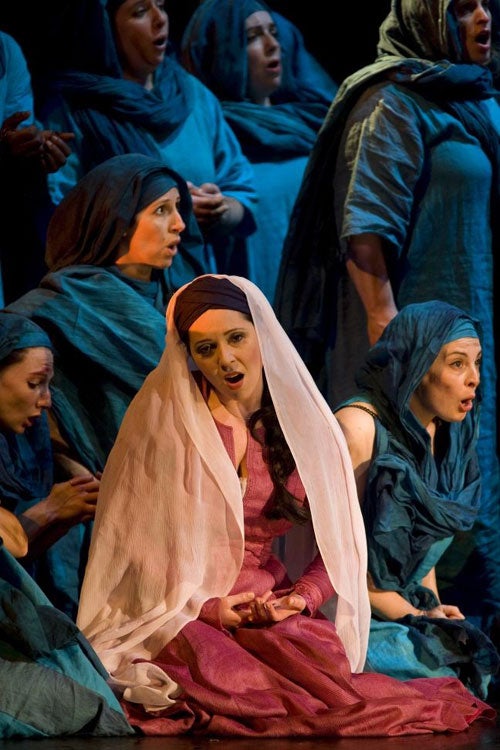Aida, Wales Millennium Centre, Cardiff

Like its Don Carlos three years ago, Welsh National Opera's new Aida is its first attempt on the big Millennium Centre stage at a work that was always straitjacketed by the New Theatre. But it has the same problem of scale, since it has to tour. So the director John Caird adopts a similar tactic of confining the action, this time within an arena-like set designed by Yannis Thavoris, which limits the triumph scene but succeeds in stacking the chorus vertically.
This approach responds well to the conductor Carlo Rizzi's perhaps surprising view of Aida as essentially a chamber opera. The intimate dialogue scenes that are the core of Verdi's final study in the conflict between public duty and private passion work superbly in a space that can be shrunk downwards by lighting. And Caird's idiom is neutral enough on the Egyptology question to fit a less monumental image without stripping out all historical context. Emma Ryott dresses her priests authentically but her soldiers like medieval Caucasians in chain-mail, and the populace like extras from – well, Don Carlos. Dennis O'Neill's squat, darkly dressed Radames even reminded me of a more recent Italian conqueror of Ethiopia...
O'Neill may not look like a conventional military hero, or indeed a Latin lover, but there's not much wrong with the voice that wouldn't be improved by a touch more warmth of line and timbre. He remains a stylish, thoughtful Verdian, and a deservedly popular local figure, as does Phillip Joll, who returns to WNO as an Amonasro of strong presence, if not vibrant tone.
Zvetelina Vassileva's Aida is another matter. She brings tenderness, brilliance and a certain edgy vitality to a part that can lapse into psychological vacuity. Her "Ritorna vincitor" beautifully expressed the irresoluble conflicts in her situation, and with marvellous control that she retained to the very end. Margaret Jane Wray's Amneris was less fortunate. She ran out of voice just when she needed it most, for her invective against the High Priest (the excellent Andrew Gangestad), but was strong previous to that, especially in her tormenting of Aida – all the more sadistic for its menacing beauty of tone.
Rizzi proves yet again what a fine Verdian he is. Everything is paced well, the voices supported not threatened, but the vivid orchestration also gets its due, with exquisite wind-playing in particular. The chorus is as masterly as ever.
To 14 June (0870 040 2000)
Join our commenting forum
Join thought-provoking conversations, follow other Independent readers and see their replies
Comments
Bookmark popover
Removed from bookmarks